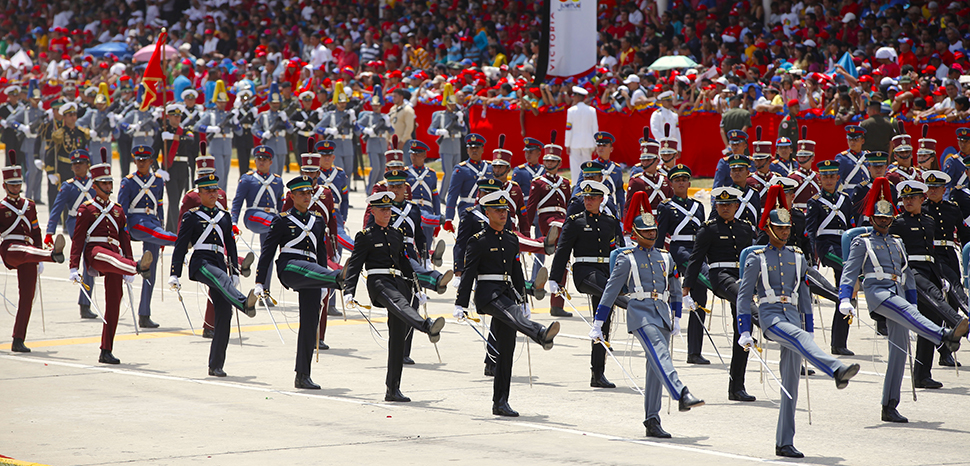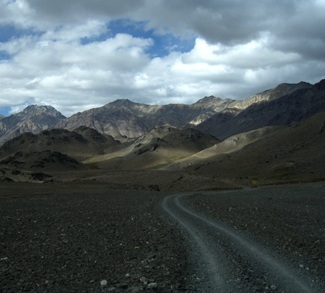An upcoming summit of the Caribbean Community (CARICOM), a bloc that comprises 14 mostly Anglophone sovereign small states, is billed to put the latest episode in Venezuela’s saber-rattling vis-à-vis the oil-rich Essequibo region under a spotlight. Just weeks on, since Caracas marshalled a phalanx of military assets near Venezuela’s border with Guyana, one of the more interesting questions regarding CARICOM regionalism is whether—as far as a diplomatic response is concerned—member states can act decisively and uniformly in this moment.
It is entangled with an imminent, high stakes presidential race in Venezuela, as strongman President Nicolás Maduro is doubling down on using the border controversy as a political football. It is also caught up in what, beneath the surface of public-facing diplomacy, are growing divisions (behind the scenes) in the politics of regionalism in respect of members showing solidarity with Guyana and what this portends for their bilateral relations with Venezuela.
What this dynamic interplay of competing forces reveals about whether CARICOM member states are similarly invested in pursuing sharper versions of the attendant diplomacy on display, to-date, can be sketched in a four-pronged manner.
First, by and large, they are approaching their energy security with due regard to Venezuela. This is hardly surprising, given the extent of their dependence on energy imports; “on average, [they] import an estimated 87 percent of their oil.”
CARICOM member states are still too reliant on oil, and they are price takers in and are at the mercy of the global oil market.
Years ago, with some exceptions, they welcomed Caracas’ now defunct oil-driven diplomacy. Several still hold out hope for a reboot of the so-called Petrocaribe initiative, which was once the linchpin of Caracas’ diplomatic inroads into the CARICOM bloc.
Such a stance is hardly novel to the region, seeing that—in the wake of Russia’s full-scale invasion of Ukraine, which elicited wide-ranging Western sanctions—even as European Union members make strides to decouple themselves from Russian gas supplies, they are not “ready to give it up.”
Regardless of its political geography, then, the praxis of regionalism does not stand apart from realpolitik.
Second, if interest indeed is “defined in terms of power,” CARICOM member states have multi-sided Venezuela-related interests, with deep historical qua diplomatic roots. And those states are bent on advancing them on their own merits. (If Venezuela crosses the Rubicon à la Guyana, though—which is CARICOM’s redline—those respective relations stand to go over the edge.) In point of fact, while they have certain common interests as SIDS, the grouping’s constituent document only commits them to “co-ordinate [their] foreign policies.”
This means policy differences are apparent. They are especially stark, with respect to governments of the day, along ideological and attitudinal lines. For instance, where relations between Guyana and Venezuela have deteriorated—so much so that they are highly instrumentalized and flush with suspicion (amid rising stakes)—the latter country enjoys strong ties with St. Vincent and the Grenadines. Indeed, with Caracas in its diplomatic sights, Kingstown promulgates a consensual normative foreign policy vision. These efforts paid dividends, courtesy of Caracas, for Kingstown.
Third, historically, the top dog moniker has been variously applied to a handful of states in the CARICOM bloc. They took up the mantle, at any one given time, on account of their economic and foreign policy bona fides. Guyana’s rising oil and gas stock has contributed in droves to both, which comprise relational status metrics.
One need look no further than the astronomical growth of the Guyanese economy since the advent of oil production in that country’s offshore territory, which undergirded the “highest real GDP growth in the world in 2022.” This state of affairs is projected to translate into a boon for the country’s long-term economic prospects. Moreover, insofar as Guyana’s sovereignty is now bound up in consequential Western-backed hydrocarbon capitalism, associated security actors have deepened their security cooperation with Georgetown.
As International Relations scholars contend, the quest for status plays an outsized role in shaping foreign policy. Arguably, respective CARICOM member states also strive for such status. For better or for worse, they do so in full view of each other.
Guyana is becoming, in its own right, a force to be reckoned with among the bloc’s long-established power brokers. Sister states look on, with some having hit rough patches in trying to get in on the action.
Fourth, as they are careful not to burn bridges with a range of third parties, CARICOM member states have held starkly contrasting positions on Venezuela. This may not be about Venezuela per se, but about its allies and partners, with whom CARICOM bloc countries tend to also have an interest in maintaining good relations. Cuba, a long-standing friend of CARICOM, comes to mind. (Instructively, and perhaps with a like-diplomatic logic in mind, Havana has elected to refrain from publicly pronouncing on the flare ups regarding the Guyana-Venezuela border controversy.)
Such small states, the scholarly thinking goes, hedge their foreign policy-related bets—in line with their security challenges and in order to derive advantages vis-à-vis their respective national interests.
What is also true is that, to a large extent, increasing energy cooperation between several CARICOM member states (Guyana excepted) and Venezuela will undercut Georgetown’s interests, weighing down Guyana’s rise within the bloc and beyond. This will also clear the way for Caracas’ increased influence in CARICOM regionalism, at a time when it is on the outs with Washington.
Concurrently, members of the CARICOM bloc are faced with the choice between supporting a more weighty role for Caracas relative to this grouping, with implications for them and Guyana alike, or, casting their lot with Georgetown’s efforts to counter Caracas in the region, if not more so solidifying its status-related prestige.
What is clear as day is that, given the strategic environment, the stakes are high. For some, who remain wary of Caracas’ geostrategic ambitions, the juxtaposition of CARICOM (energy) security and Venezuela speaks for itself. For others, they are not so convinced.
Seen through this foreign policy-related prism, the CARICOM bloc is at an inflection point.
From Guyana’s point of view, it has some hurdles to overcome within the grouping.
Given these stakes, any notion of a cohesive regional approach to threat assessment around border issues—the realm of high politics—is increasingly playing second fiddle to national-level diplomatic considerations.
There are clear differences in the way that respective CARICOM member states approach their relationships with Venezuela which, in turn, affects how they engage with each other accordingly. Given these myriad foreign policy contexts, coalescing around a single approach or strategy directed at Caracas—when it acts with a hint of menace—is easier said than done.
This record is at odds with CARICOM member states’ holistic diplomatic stance relative to Russia, whose adversarial posture regarding the full-scale invasion of Ukraine undermines their security, too. For them, there is no daylight between their respective positions on the global-level, geopolitical issue of the hour: Russia’s now two-year-old war in Ukraine. The conflict inspired a unity among these states in defense of such United Nations’ (UN) principles as sovereignty and territorial integrity, the likes of which Caribbean analysts have not seen in years.
In short, this globally impactful geopolitical maneuver of the moment threw those very UN guardrails on the ‘rules of the (multilateral) road’ into a crisis of historic proportions and, given the wider (potential) repercussions for them, CARICOM member states were not having any of it. What is more, generally, they have forgone foreign policy-related opportunities which run afoul of this principled stand.
Guyana, one would have thought, figures frontally in this calculus. (This is not to say that, in the process, other CARICOM states are not looking out for themselves.) No stranger to contested borders, and compelled in recent years to seek legal recourse at the International Court of Justice, Guyana has been in an unenviable position since the earliest days of its post-independence journey thus far. (A quintessential former British colony, whose erstwhile overlords wrongheadedly engineered a societal superstructure on top of a plantation economy, Guyana gained its independence in 1966.) For decades now, it has been dogged by Venezuela’s Essequibo-related territorial claims.
Back then, as now, Guyana’s sovereignty was / is (partly) tied to its fraught relations with Venezuela. When border tensions bubble over, given the military power qua military force structure constraints on such a small state, Guyana is left scrambling to contain the situation. This in a context where, for decades, Guyana was weighed down by the vagaries of acute underdevelopment.
Seized of these dynamics, Georgetown makes no bones about calling attention to Guyana’s unfettered right to come into its own by leveraging its newfound oil prowess. Above all, Georgetown is dead set against efforts by Caracas to stymie Guyana’s rise, to cutaway at its sovereignty and to hold back CARICOM regionalism’s progress.
In sum, today, in a context where the specter of Venezuela wielding its hard power in the only English-speaking country in South America—thus, looming over the fate of Guyana’s sovereignty—also hangs over the CARICOM regional grouping, their collective security challenge is even greater. More fundamentally, it seemingly does not feature prominently in the bloc-level, foreign policy-related long game (and there is little realistic prospect that it will); at least, not in the same way that the primacy of the national interest is zealously pursued.
If there was ever a time for the reverse to be the case, as regards this narrative, it would be now.




